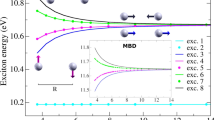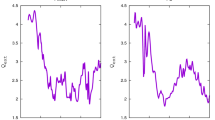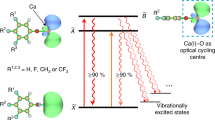Abstract
IT is known that the molecular refraction, as defined by Lorenz–Lorentz, of liquid (non-aromatic and non-conjugated) organic compounds may be calculated with fair accuracy by summation of the atomic refractions and the contributions to structural influences which may play a part (for example, olefinic double bonds). For aromatic compounds this additive character of the molecular refraction does not apply. Here the value measured is nearly always greater than the sum of the atomic refractions and contributions due to double bonds.
This is a preview of subscription content, access via your institution
Access options
Subscribe to this journal
Receive 51 print issues and online access
$199.00 per year
only $3.90 per issue
Buy this article
- Purchase on Springer Link
- Instant access to full article PDF
Prices may be subject to local taxes which are calculated during checkout
Similar content being viewed by others
References
Vogel, A. I., Cresswell, W. T., Jeffery, G. H., and Leicester, J., J. Chem. Soc., 514 (1952).
Author information
Authors and Affiliations
Rights and permissions
About this article
Cite this article
VAN KREVELEN, D., BLOM, L. & CHERMIN, H. Optical Exaltation in Aromatic Compounds. Nature 171, 1075–1076 (1953). https://doi.org/10.1038/1711075b0
Issue Date:
DOI: https://doi.org/10.1038/1711075b0
Comments
By submitting a comment you agree to abide by our Terms and Community Guidelines. If you find something abusive or that does not comply with our terms or guidelines please flag it as inappropriate.



